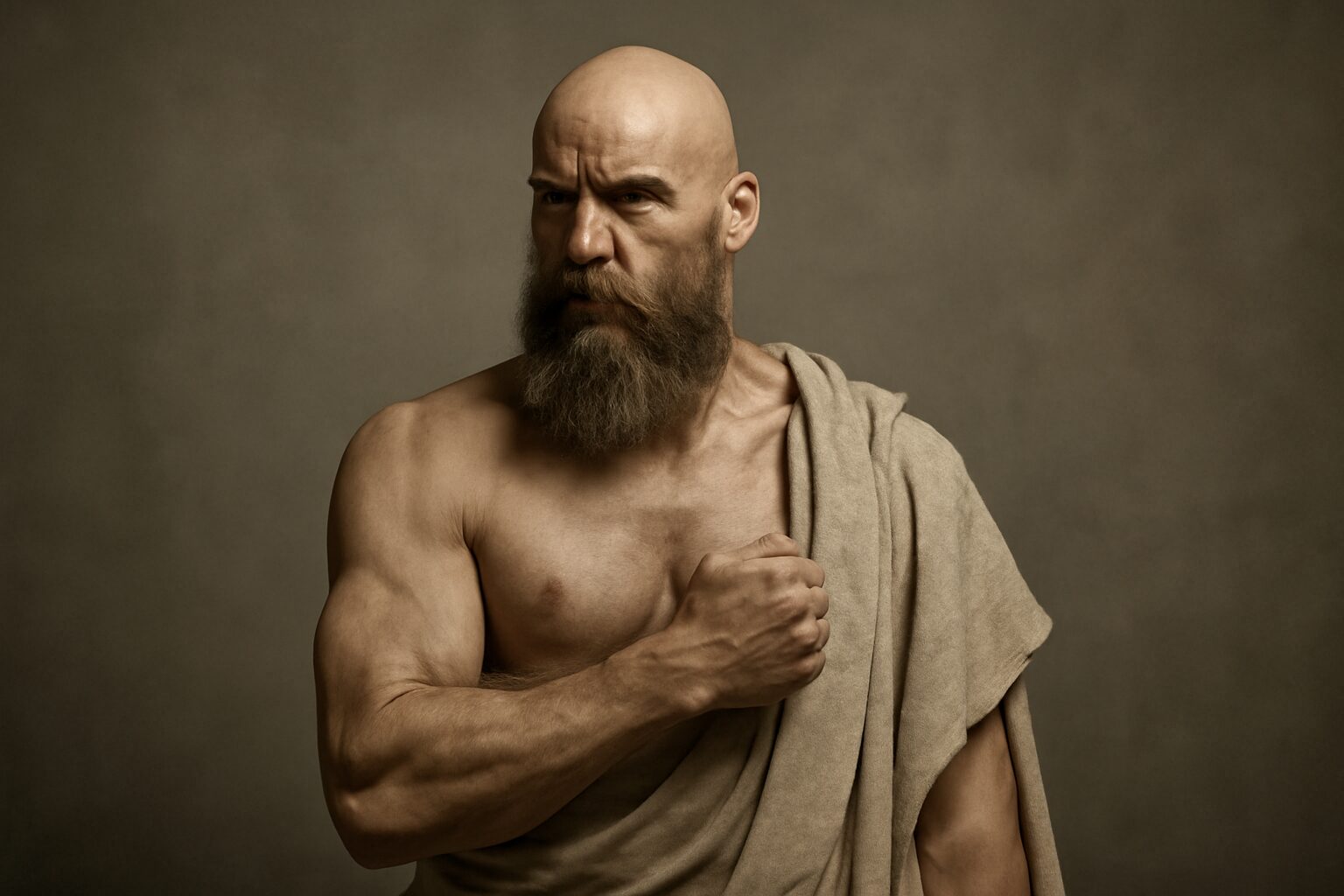Kratos: The Divine Personification of Strength
In Greek mythology, Kratos (or Cratos) is the divine embodiment of raw strength, power, and might. His name literally translates to "strength" or "power," and he played a crucial, though often overlooked, role in the cosmic order of the gods.
Origins and Family
Kratos was the son of the Titans Pallas and Styx, making him a sibling to Nike (Victory), Bia (Force), and Zelus (Zeal). His mother, Styx, was the goddess of the Underworld river, and she allied herself with Zeus during the Titanomachy—the great war between the Titans and Olympians. As a result, Kratos and his siblings became loyal enforcers of Zeus's rule.
Role in Mythology
Kratos is best known for his appearance in Aeschylus' tragedy "Prometheus Bound", where he assists Hephaestus in chaining the Titan Prometheus to a rock as punishment for stealing fire from the gods and giving it to humanity. Unlike the sympathetic Hephaestus, Kratos is unyielding and merciless, embodying the brutal enforcement of Zeus's will. He taunts Prometheus, declaring that no one can defy the king of the gods.
Powers and Symbolism
As the personification of strength, Kratos possessed immense physical power, but his significance was more symbolic than active in most myths. He represented the unyielding force required to maintain divine order, often acting as Zeus's enforcer alongside his siblings. Unlike the more famous hero Heracles (Hercules), Kratos was not a warrior or adventurer but a divine force of authority.
Legacy and Modern Influence
Though Kratos was a minor figure in ancient texts, his name and concept were revived in modern pop culture, most notably as the protagonist of the "God of War" video game series. However, the game's Kratos is a vastly different character—a vengeful Spartan warrior who battles gods—far removed from the original mythological figure.
In classical mythology, Kratos remains a fascinating symbol of absolute power and the often ruthless nature of divine justice, serving as a reminder that strength, in its purest form, is neither heroic nor villainous—it simply is.
Alternative Names for Kratos
God Name: Potestas (Roman)
In Roman mythology, Kratos is sometimes equated with Potestas, a personification of power and authority. This name reflects similar attributes of strength and dominion.
God Name: Bia (Greek (alternative epithet))
In Greek mythology, Kratos is often associated with Bia, the personification of force and violence. They are siblings and frequently appear together in myths, symbolizing raw power and coercion.
God Name: Kratos Nikephoros (Greek (epithet))
An epithet meaning 'Kratos the Bringer of Victory,' highlighting his role in ensuring triumph through sheer power and dominance.
Tales about Kratos
The Binding of Prometheus: Kratos and Bia
When Prometheus defied Zeus by stealing fire for humanity, the king of the gods decreed a punishment that would serve as a dire warning. He summoned Kratos, the embodiment of strength, and his sister Bia, the spirit of force, to carry out the sentence. Together, they journeyed to Mount Caucasus, where they bound the Titan to the rock with unbreakable adamantine chains.
A Cruel Task
Kratos, with his immense power, held Prometheus firm while Bia forged the chains, her relentless will ensuring there was no escape. Each link was a testament to Zeus's wrath, and as the eagle descended daily to feast on the Titan's liver, Kratos stood guard, a silent enforcer of divine justice. This tale illustrates the unyielding nature of Kratos, who, alongside Bia, became an instrument of Olympian order, demonstrating that even strength must sometimes serve cruelty.
The Trial of Strength: Kratos and Zelos
In the halls of Olympus, Zeus once devised a contest to determine the truest embodiment of might among his divine servants. He pitted Kratos against Zelos, the personification of rivalry and zeal. The challenge was to hold up the crumbling pillars of a temple dedicated to Athena, testing not just brute force but enduring will.
A Clash of Powers
Kratos, with his raw, unwavering strength, shouldered the marble columns, his muscles straining but never failing. Zelos, fueled by competitive fervor, pushed with equal intensity, yet his zeal began to wane as the hours stretched into days. In the end, Kratos stood triumphant, the pillars secure, while Zelos conceded, acknowledging that true strength outlasts mere rivalry. This story highlights Kratos's role as the steadfast force that underpins victory and stability.
Frequently Asked Questions
Who is Kratos in Greek mythology?
Kratos is the divine personification of strength and power in Greek mythology. He is the son of the Titans Pallas and Styx, and he often serves Zeus by enforcing his will with brute force.
What are daimones in Greek mythology?
Daimones (or daemons) are lesser deities, spirits, or personifications of abstract concepts in Greek mythology. They can represent emotions, natural forces, or moral qualities, acting as intermediaries between gods and humans.
Why are personifications important in Greek mythology?
Personifications help explain abstract ideas, emotions, and natural phenomena by giving them human-like forms and traits. They make complex concepts easier to understand and relate to in stories and religious practices.
How does Kratos differ from the God of War video game character?
In Greek mythology, Kratos is a minor deity representing strength, while the video game character is a fictional Spartan warrior who battles gods. The game takes inspiration from mythology but creates its own storyline and interpretation.
Are daimones good or evil in Greek mythology?
Daimones are neither inherently good nor evilu2014they embody neutral forces or concepts. Some may be beneficial (like protective spirits), while others represent negative traits (like fear or strife), depending on their role in myths.













